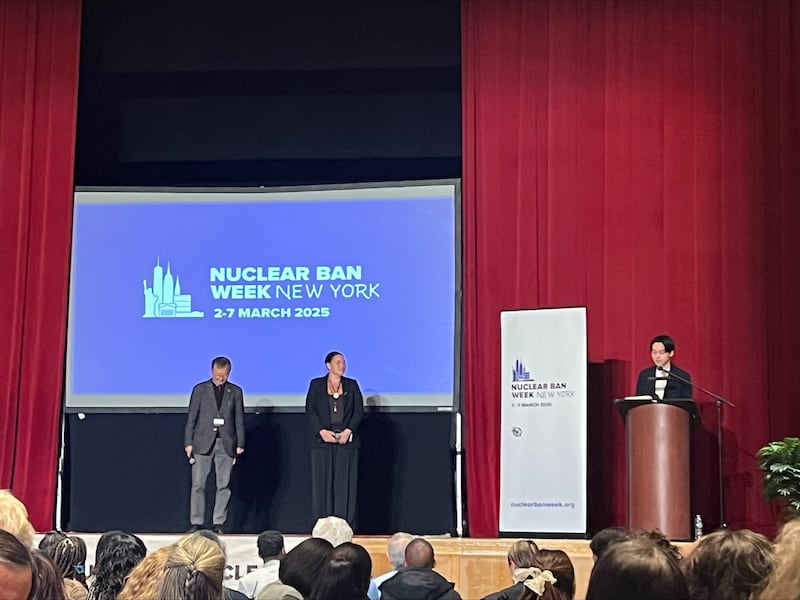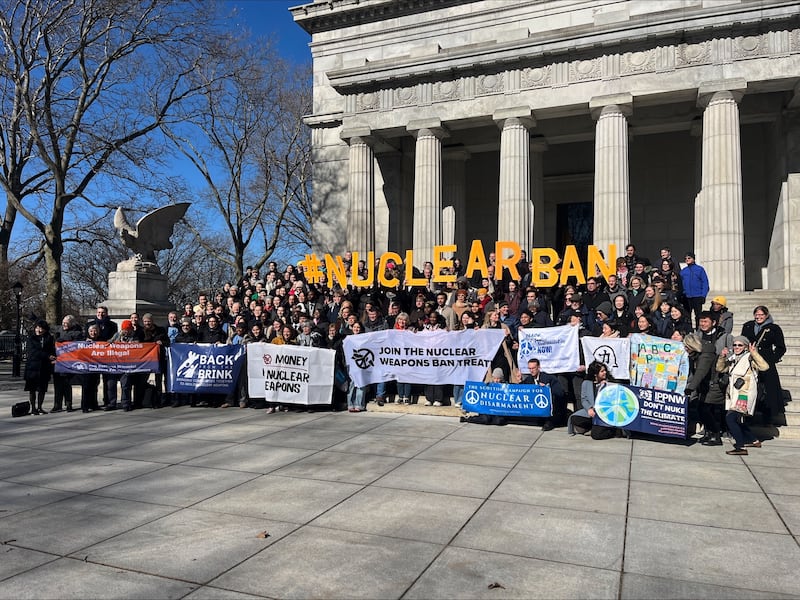This week Wahine Māohi activist Vehia Wheeler attended the Treaty on the Prohibition of Nuclear Weapons meeting, urging France to sign the treaty and take responsibility for its nuclear testing legacy in the Pacific.
Wheeler, a PhD student at the Australian National University in Canberra and an advocate for environmental justice, was in New York alongside four other Māohi activists.
They shared testimonies on the lasting impacts of nuclear weapons, including politician Hinamoeura Morgant-Cross, who spoke to Te Ao Māori News last year on France’s nuclear legacy through intergenerational cancers in her whānau.
Kua toru tekau tau ngā iwi Māohi e rongo nei i ngā pānga kikino
I te 7 o Hūrae 2017, tāmoko ai te tiriti poropaihana i ngā pahū kariri.
Ko tēnei tiriti he kawenata e herea ana, e aukati ana hoki i te whakamahinga, te whakawhanake, te whakamātautau, me te pupuri i ēnei momo kariri.
Koinei te tuatoru o ngā hui a ngā whenua, e 73, ā, ko Aotearoa tētahi. Ka mutu, mehemea i haina tētahi whenua i te kirimana nei, arā ngā herenga ā-ture me ngā haepapa kei runga i ngā whenua nei.
E toru tekau tau whakamātauria ai e te whenua o Wīwī ngā pahū kariri ki Mururoa me Whangataufa i Māohi Nui, ka mutu, kīhai i mōhio a Wīwī i ngā pānga kikino o ngā whakamātautau pahū kariri.
Heoi, i te tau 2021, i puta i te whare wānanga o Princeton he pūrongo e kīia ana, kotahi rau tekau mano tāngata i pākia e te iraruke.

The entirety of Polynesia affected
The 110,000 people affected by the nuclear fallout were 90 per cent of the Polynesian population at the time.
“Everyone is impacted because the fallout reached our principal islands. That fallout has changed our DNA permanently,” Wheeler said.
“Even though I wasn’t alive during the [nuclear] testing, my mom was living in these islands...her DNA has changed. My DNA has changed. My descendants will have France’s weapons arms race within their bodies.”
Some fish remain poisonous prompting locals to set a rāhui
Altogether, there were 193 detonations.
“Right after the detonations, people would eat the fish and drop dead. They would be taking people to the hospital in wheelbarrows, and that’s how they figured out the fish were poisonous,” Wheeler said.
“We helped ourselves get out of that mess and enact our own rāhui onto our fish, but that wasn’t because France helped us; it was trial and error.”
Up until today, almost thirty years later, people living close to the testing sites are unable to eat fish from the lagoons where they live, and she says it’s to the point where it’s normal.

“We kind of feel helpless about it because it’s an uphill battle—to continue to ask your coloniser to help. Help you clean up the environmental mess or do studies that are honest or to have appropriate medical care.”
Compensation and medical aid fall short
In February, Ambassador to the Pacific Véronique Roger-Lacan said this was disinformation that France hasn’t done enough in medical assistance and compensation.
“There is a huge amount of money the French state brings to French Polynesia to treat this issues of post-nuclear diseases,” Roger-Lacan said.
“These are taken very seriously by everyone in France, and no one can escape this responsibility. And there is no way that the French state, the French administration, and the French public health system wants to escape this responsibility.”
1/ A powerful 1st day at the Meeting of States Parties to the #TPNW. We heard from nuclear weapons use/test survivors, world leaders & experts, all reaffirming
— ICAN (@nuclearban) March 3, 2025
one message: we need more than arms control and non-proliferation, we need the total elimination of nuclear weapons 📢 pic.twitter.com/SEp1sy3C2o
Wheeler said the medical barrier was that there’s a hospital on the main island but not on the islands most impacted by nuclear testing. Furthermore, the hospital doesn’t have all the cancer facilities needed for treatment, so they must travel to France, and some end up dying away from their homelands.
Wheeler said that in 2024, 816 claims were filed, but only 152 were accepted and received compensation.
Te Ao Māori News reached out to New Zealand’s Embassy of France. The details have been passed on to Paris, but they were unable to respond by the time this article was published, and we are awaiting further comments.


